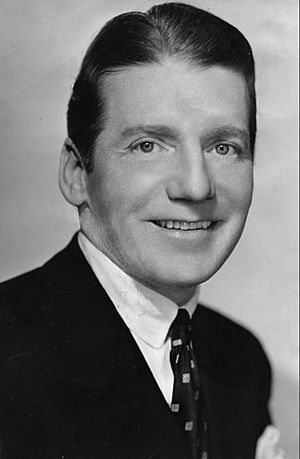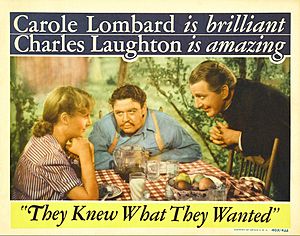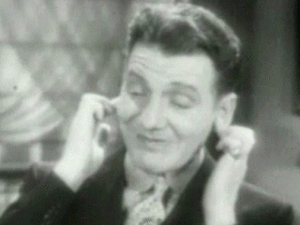Frank Fay (American actor) facts for kids
Quick facts for kids
Frank Fay
|
|
|---|---|

Fay in 1936
|
|
| Born |
Francis Anthony Donner
November 17, 1891 |
| Died | September 25, 1961 (aged 69) Santa Monica, California, U.S.
|
| Resting place | Calvary Cemetery, Los Angeles |
| Years active | 1918–1955 |
| Spouse(s) |
Frances White
(m. 1917; div. 1917)
|
| Children | 1 |
Frank Fay (born Francis Anthony Donner; November 17, 1891 – September 25, 1961) was an American vaudeville comedian, film, and stage actor. He was a pioneer in stand-up comedy, which means he was one of the first to perform comedy by himself, talking directly to the audience.
For a time, Frank Fay was a very famous and important star. However, he later became less well-known. This was partly because he had a difficult personality and held strong, unpopular political views. He is also remembered for playing Elwood P. Dowd in the 1944 Broadway play Harvey. Many people know him as the first husband of actress Barbara Stanwyck. Some believe their marriage inspired the 1937 film A Star Is Born. This movie shows a wife becoming famous while her husband's career declines.
Frank Fay was known for being difficult to work with. He often offended people because he had a very high opinion of himself. Actor Robert Wagner even wrote that Fay was "one of the most dreadful men in the history of show business."
Contents
Early Life and Career Beginnings
Frank Fay was born as Francis Anthony Donner in San Francisco, California. His parents were Irish Catholic. He decided to change his name to Frank Fay because he thought his birth name wasn't good for the stage.
When he was a child, he performed in a musical play called Babes in Toyland.
Vaudeville Success and Comedy Style
Frank Fay became very successful as a variety artist around 1918. He would tell jokes and stories in a way that seemed unplanned, but was actually very carefully prepared. This style was quite new and original for his time. He was known for his excellent timing and delivery, which other comedians admired. Jack Benny, another famous comedian, said he based his early stage character on Frank Fay.
During the 1920s, Fay was one of the highest-paid performers in vaudeville. He earned $17,500 a week, which was a huge amount of money back then! He often performed at the famous Palace Theatre in New York City.
Later, he also found success as a comedian and master of ceremonies in revues and nightclubs. He might have even started the idea of a master of ceremonies. He also appeared often on radio shows.
One of his most popular comedy acts involved taking a well-known song and pointing out how "senseless" the lyrics were. For example, he would joke about the song "Tea for Two":
- "Picture you, upon my knee." (He'd say, "This guy only owns one chair?")
- "Just tea for two and two for tea, me for you, and you for me, alone." (He'd joke, "So, the guy has one chair, but enough tea for two. If anyone else shows up, he shoots 'em!")
- "We won't have it known, dear, that we own a telephone." (He'd ask, "This guy is too cheap to get another chair, but he has a telephone and won't tell anyone about it!")
Frank Fay in Films
When "talkies" (movies with sound) became popular, Warner Bros. studio wanted to sign Frank Fay. He was chosen to be the master of ceremonies in Warner Bros.' most expensive movie of 1929, The Show of Shows. This film featured many famous stars.
Because of this success, Fay quickly got another role in a musical comedy called Under a Texas Moon (1930). In this movie, he also showed his singing talent. The film was popular, and its theme song became a hit. He then starred in another big musical, Bright Lights (1930).
Fay also appeared in The Matrimonial Bed (1930), a comedy where he sang a song twice. He became known for musical films. However, public interest in musicals decreased around 1931, which led to a decline in his popularity. In his next film, God's Gift to Women (1931), the musical parts were even removed for the American release.
His humor, which was sometimes a bit daring for the time, didn't fit well with the changing public mood during the Great Depression. His later films did not receive the same good reviews he had enjoyed before. In 1932, he tried to make his own film, A Fool's Advice, but it was not successful.

Later Career and Controversies
Frank Fay had a short comeback in films in 1943. He was supposed to star with comedian Billy Gilbert in a series of comedies. However, he left after the first movie, Spotlight Scandals. Another comedian, Shemp Howard, took his place.
In 1944, Frank Fay starred in the play Harvey, which was his last big success.
Frank Fay held very strong and controversial political opinions. In 1946, a large gathering of people with extreme views took place at Madison Square Garden. This event was called "The Friends of Frank Fay."
In 1951, he had a role in a movie called Love Nest.
Personal Life
Frank Fay married Barbara Stanwyck in 1928. At that time, she was not very famous. He helped her develop her film career, and she later got a contract with Warner Bros. They appeared together in only one short film, The Stolen Jools (1931).
On December 5, 1932, they adopted a son named Dion. Their marriage reportedly became difficult when Barbara Stanwyck's career became more successful than Fay's. They divorced in 1935.
Later Life and Death
Before he passed away, Frank Fay was declared legally unable to manage his own affairs. On September 20, 1961, he was admitted to St. John's Hospital in Santa Monica, California. He died there five days later, at the age of 69, from a ruptured abdominal aorta. Frank Fay was buried in Calvary Cemetery in Los Angeles.
Honors
Frank Fay has two stars on the Hollywood Walk of Fame. These stars honor his contributions to the entertainment industry.
Filmography
| Year | Title | Role | Notes |
|---|---|---|---|
| 1929 | The Show of Shows | Master of Ceremonies | |
| 1930 | Under a Texas Moon | Don Carlos | |
| 1930 | The Matrimonial Bed | Leopold Trebel | |
| 1930 | Bright Lights | Wally Dean | retitled as Adventures in Africa |
| 1931 | God's Gift to Women | Toto Duryea | |
| 1932 | A Fool's Advice | Spencer Brown | re-released as Meet the Mayor |
| 1935 | Stars Over Broadway | Announcer | |
| 1937 | Nothing Sacred | Master of Ceremonies | |
| 1940 | I Want a Divorce | Jefferson Anthony Gilman (Jeff) | |
| 1940 | They Knew What They Wanted | Father McKee | |
| 1943 | Spotlight Scandals | Frank Fay | |
| 1951 | Love Nest | Charles Kenneth 'Charley' Patterson |
See also
 In Spanish: Frank Fay para niños
In Spanish: Frank Fay para niños


